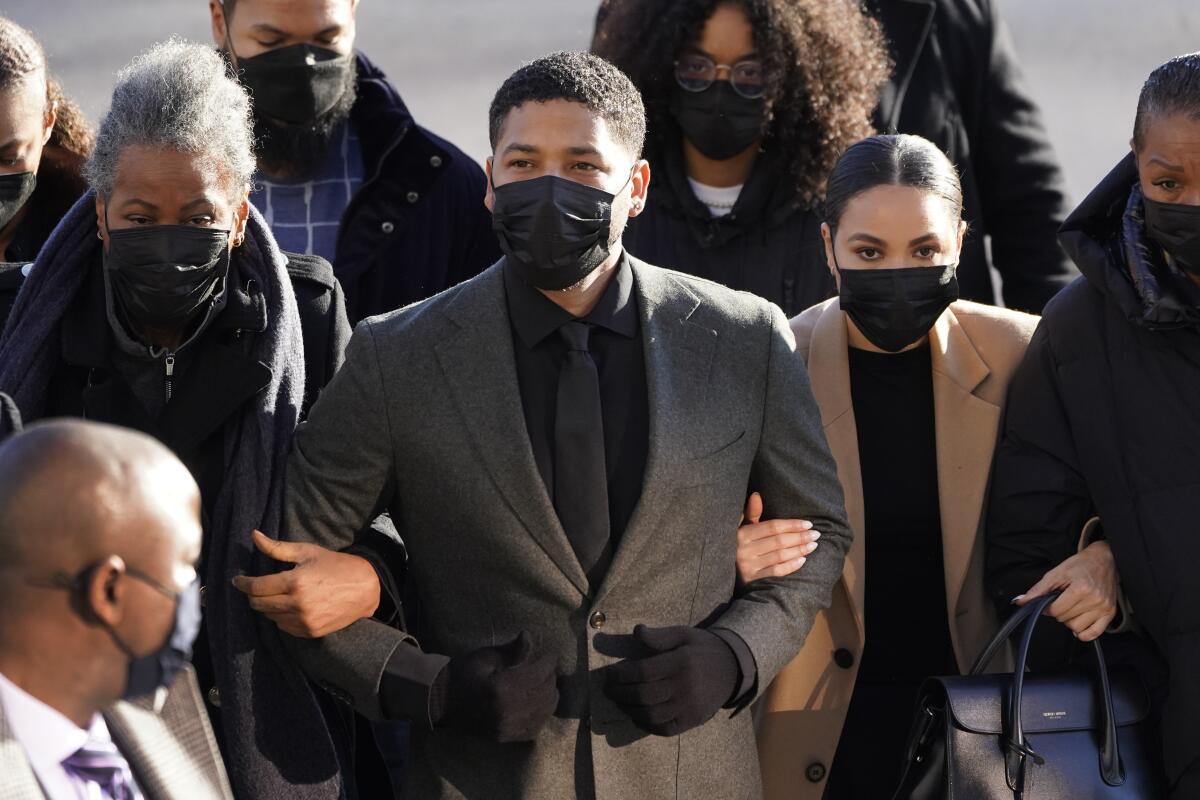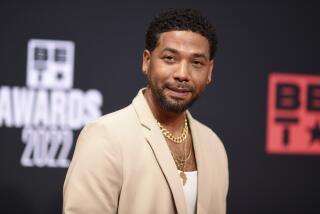Detective recounts how brothers said Jussie Smollett staged attack

- Share via
CHICAGO — Two brothers arrested in an alleged attack on Jussie Smollett told Chicago police how the ex-“Empire” actor orchestrated the hoax, telling them via text message to meet him “on the low,” paying for supplies and holding a “dry run” in downtown Chicago, the lead investigator testified Tuesday.
Taking the stand as prosecutors began their case against Smollett, former Chicago Police Det. Michael Theis said he initially viewed the actor as a victim of a homophobic and racist attack and that police “absolutely” didn’t rush to judgment, as Smollett’s defense attorney alleged during opening statements Monday.
Theis, who now is assistant director for research and development for the Chicago Police Department, said roughly two dozen detectives clocked some 3,000 hours on what they thought was a “horrible hate crime” in January 2019. He said they were excited when they were able to track the movements of two suspected attackers using surveillance video and cellphone and rideshare records.
“The crime was a hate crime, a horrible hate crime,” Theis said, noting Smollett — who is Black and gay — reported that his attackers put a noose around his neck and poured bleach on him. He said the case had become national and international news and that “everybody from the mayor on down” wanted it solved, a reference to then-Mayor Rahm Emanuel.
Smollett is charged with felony disorderly conduct for making what prosecutors say was a false police report about the alleged attack. The Class 4 felony carries a prison sentence of up to three years, but experts have said if Smollett is convicted, it’s likely he would be placed on probation and perhaps ordered to perform community service.
After police arrested Abimbola and Olabingo Osundairo — brothers who also worked on the “Empire” set — as they returned to Chicago from Nigeria, the men said Smollett wanted to stage the attack because he was unhappy about how the TV studio handled hate mail the actor had received, Theis said.
He said investigators checked out the brothers’ account, including that the actor picked them up days before the attack and drove them around the area of downtown where he lived and talked about what would happen, and corroborated their version of events using GPS, cellphone records and video evidence.
Police found no instance where they concluded the men were lying, he added.
“At the end of the investigation, we determined that the alleged hate crime was actually a staged event,” Theis said, and the Osundairo brothers were released.
Jurors were shown surveillance video of the brothers buying supplies, including a red hat they told police Smollett wanted them to wear to resemble supporters of then-President Trump, and a piece of clothesline later fashioned into the noose.
Jurors also saw a still image from a video that Theis said showed Smollett returning home the night of the alleged attack, with the clothesline draped around his shoulders. The clothesline was wrapped around his neck when officers arrived, Theis said, leading detectives to believe Smollett may have retied it.
Muhammad Baig, the first officer on the scene after Smollett’s manager reported the attack, said he asked Smollett if he wanted to take the rope off his neck and “he responded by saying that he’d like to take it off but he wanted us to see it first.” He also said Smollett asked officers to turn off their body-worn cameras, which they did.
Defense attorney Nenye Uche said during opening statements Monday that Smollett “is a real victim” and that the brothers attacked Smollett because they didn’t like him “because of who he is.”
On Tuesday, Uche suggested the brothers were homophobic, asking Theis on cross-examination about a homophobic word one of the brothers used. Theis said there was a message containing a slur but that he doesn’t know if that makes the man homophobic. Uche also asked Theis if he was aware one of the brothers attacked someone at the TV studio because he was gay.
“One individual said it happened, but I don’t know that it happened,” Theis said.
Uche also sought to discredit the police investigation, suggesting detectives ignored possible leads. And he said a $3,500 check the actor paid the brothers was for personal training so he could prepare for an upcoming music video, not for carrying out the hoax, as prosecutors allege. Theis said Tuesday that the memo on the check said it was for “nutrition” and “training.”
The brothers will testify during the trial, but it’s unknown if Smollett will.
Uche portrayed the brothers as unreliable, and said when police searched their home they found heroin and guns.
Special prosecutor Dan Webb told jurors that Smollett told police he was attacked by Trump supporters, inflaming political divisions nationwide.
Webb said Smollett thought the TV studio didn’t take hate mail he received seriously. Police haven’t determined who wrote the letter, which included a drawing of a stick figure hanging from a tree and “MAGA,” a reference to Trump’s Make America Great Again campaign slogan. Webb said Smollett told the brothers to shout racial and homophobic slurs and “MAGA” during the staged attack.
Uche also suggested that a third attacker was involved. One resident said she saw a white man with “reddish brown hair” who appeared to be waiting for someone that night, according to police reports. She told a detective that when the man turned away from her, she “could see hanging out from underneath his jacket what appeared to be a rope.”
Uche referenced the woman during his cross-examination of Theis on Tuesday, and Theis acknowledged that he saw that statement but did not send a detective to re-interview her. He said the woman had seen the man a few hours before the alleged attack and that “the rope was a different color.”
Outside the courtroom, Smollett’s brother said it has been “incredibly painful” for the family to watch Smollett be accused of something he “did not do.”
“We’re confident in his legal team, and we look forward to people hearing the actual facts of this case,” Jojo Smollett said.
Judge James Linn expects the trial to last about a week.
More to Read
Sign up for Essential California
The most important California stories and recommendations in your inbox every morning.
You may occasionally receive promotional content from the Los Angeles Times.










